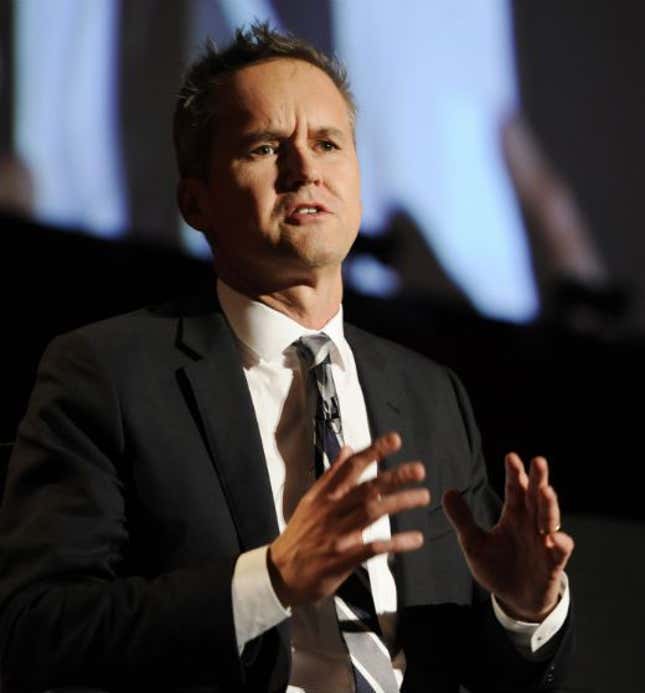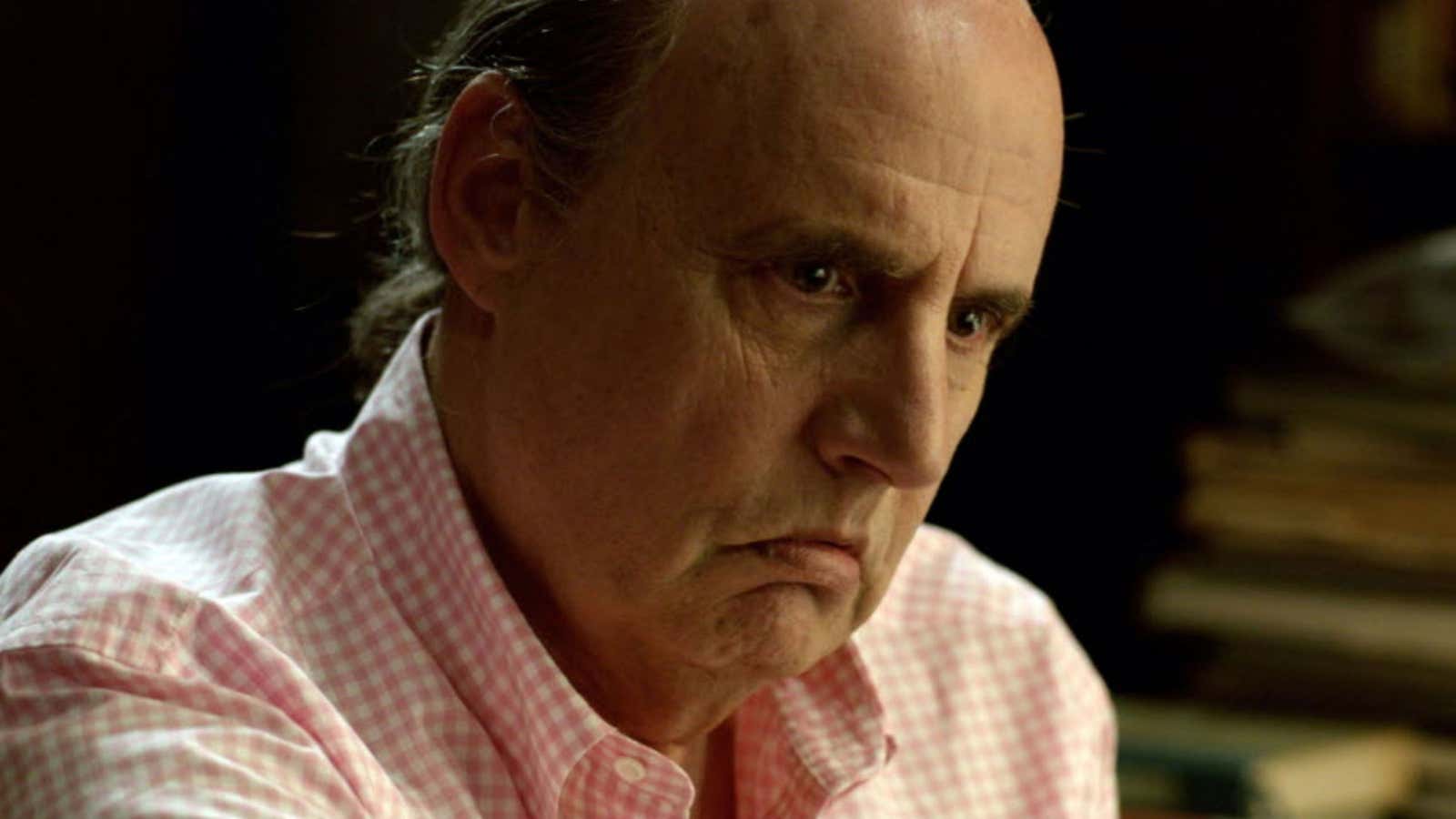Netflix may have had a big head start in streaming original series, but Amazon is quickly closing the gap. Amazon Studios launched in 2010 and produces original shows that can be streamed for free by the retail site’s more than 20 million Amazon Prime subscribers. It caught attention last year for releasing pilot episodes of its prospective shows online, and incorporating feedback from Amazon customers into decisions about which ones to pick up for a full season.
The first batch of shows didn’t produce any standout hits like, say, Netflix’s Orange Is the New Black. But the second group of pilots, released in February, were much more enthusiastically received by audiences and critics alike. Amazon’s new comedy Transparent, which will debut next month, is already generating raves. And on August 28, Amazon will unveil a promising third group of pilots, including The Cosmopolitans, a drama by Whit Stillman, and Red Oaks, a comedy produced by Steven Soderburgh.
Roy Price is the man in charge of churning out these hits. The director of Amazon Studios spoke to Quartz about his strategy, measuring success and competing with Netflix. (The interview has been edited and reordered for clarity.)

What was behind your decision to release the episodes of Transparent all at once next month, a la Netflix? You had previously resisted that approach.
There are a lot of factors in that. I think there’s a lot of enthusiasm for the concept among customers and the press. Also, the show just lent itself to that treatment, because it was very much a continuous story, and Jill [Soloway, the creator] was enthusiastic about it. So, in combination, we decided that would be the best approach. We’re always interested in trying new things, and trying things that the customers seem to be responding to, so this seemed like a good opportunity to do that.
Because Amazon Prime is a subscriber model, what defines a successful series for you? Number of viewers, whether viewers are buying products elsewhere on the site, whether viewers are passionate about a show…?
The main thing we’re focusing on is making Prime fantastic. And one of the things people really respond to is original new series, so we’re paying attention to, are people engaged with the show? Does it add value to the service as a whole? So it’s about views, and talking about the shows, and if you watch the whole season, how did you rate the show…Basically, do people really seem to value the show as part of the service?
Last year, we premiered Alpha House and Betas, and they premiered at, and hung around at, the number one and two series for awhile, so that’s very encouraging, because it shows that people are really getting into it and heavily sampling the shows. That’s the kind of thing we want to see, that it becomes a meaningful part of the value that the service provides. Ultimately, you’d like to see more people joining the service, and you’d like to see that people who watch the shows and enjoy the shows renew their subscription.
More and more shows are embracing product placement. As a retail site, is that something you’ll be pursuing, trying to integrate products into the programming that are available to purchase elsewhere on the site?
We’re really focused on creating great shows, and anything that distracts from that, or in any way takes anybody’s eyes off that particular goal, is something we want to avoid. So we have not spent time on trying to cross-promote specific products that might be elsewhere on the site, or anything like that. I tend to think that the whole concept of “I saw this TV show and someone was wearing this sweater and now I’m going to buy that,” it’s something that’s been talked about for a long time, but I’ve never really seen it work. When people are watching an entertainment show, they want to be entertained.
Like Netflix, you’ve chosen not to disclose ratings or metrics publicly, or even to share that data with the creators of your shows. What’s your thinking behind that?
First of all, it really wouldn’t even occur to us, except that people in the media have brought it up, and then we realized it’s a convention in the TV world. But in the retail world, you would tend not to publicly release the unit sales of every item you have, because that’s really the vendors’ information; they can do what they want with it. And so we report it to vendors. We’re totally open about how things are doing on a relative basis, because you can always sort on the website, within any category, by sales or popularity. So it’s not like we’re trying to hide the ball on the relative performance of shows. It’s just I’m not really certain what the upside would be. It seems almost distracting from whether you like the show or not.
If you won’t share numbers, can you talk about how people are watching your shows? Are they watching one episode at a time or binging?
A lot of people do watch them in a short time, so they binge them. It’s not like 80%, but it is a meaningful portion of the total audience for shows. We’ve definitely observed that people want to take advantage of the ability to go from episode to episode.
You’re about to roll out your third round of pilots on the site. To what extent does the public feedback really factor into your decision about which shows to pick up?
Well, the site feedback is definitely very important to the decision, and frames the conversation around which shows to pick up. In general, you don’t want to pretend to be overly precise about it. But that said, the feedback, which comes in various flavors—because there’s a survey, there are ratings, there are simple views and other types of data that we’ll get—tends to organize the shows in groups. There will be your top group, your mid group and your low group, and that’s a very important framing device. But then you still do have to have the conversation and bring to bear what we might know about the show and its future prospects and the team. So it winds up being a combination of things, but the public feedback is very influential.
Is there anything you’ve changed about the process during these three rounds?
One thing is, we do adult shows and kids’ shows. And in the kids’ shows, instead of having all the pilots be fully animated, they were partially animated, or in some cases, what we call “animatics.” Which is pretty typical for testing for kids shows, but what we realized in this case was, one studio’s concept of an animatic was more advanced than the others, so it wasn’t necessarily fair. So now, with the kids’ shows, everyone just produces a final episode version.
Were there any major differences in how US, UK, and German audiences have reacted to the pilots?
There are little differences, occasionally. Betas [which was not renewed for a second season] and Creative Galaxy were particularly popular in Germany. So you sometimes do see variations, but there’s no systematic difference in the sense that this country always likes this kind of show. At least, not that we’ve picked up so far.
Several shows with small but loyal audiences were canceled this year and looking for a new home, like Community (which ended up at Yahoo), Enlisted, and Trophy Wife. Did you have any discussion about picking one of those up, and is that something you would be open to down the road?
It’s always something to talk about and to be aware of. I would say most shows, when they shuffle off this mortal coil, do so for a reason and to bring them back usually does not result in a breakout hit. And I don’t think there are a lot of canceled shows that have that prospect. But that’s not to say that there aren’t any, and so we always want to be open to shows that did not get re-ordered, or even pilots that did not get ordered. We took a look at a few network pilots this past season but we didn’t pick any up. We’re always happy to look at stuff, so I’m sure we’ll do more in the future.
Transparent creator Jill Soloway said one of the draws about Amazon was your expediency and the chance to start filming within months, as opposed to what would be at least a year-long development process at outlets like HBO and FX.
One of the key principles we have at Amazon is “by a fraction.” We like to get things done quickly. Also, we don’t have the huge team that would tend to give rise to a lot of deliberation and bureaucracy, so we’re able to make decisions very quickly. There are really only a couple of checkpoints and people who weigh in, so it’s a pretty efficient process. So we’re able to move on stuff, which I think is helpful. And also, we will put the pilot in front of an audience, which a lot of people find reassuring. It is going to get out there into the public square and everybody is going to be able to see it. And if you think they’ll be enthusiastic, then that’s a plus.
Who do you see as your main competitor? Netflix, or other networks?
I would say that it doesn’t really serve you too well to spend a lot of time thinking mainly about the competitors and what they’re doing. It’s not as much of a zero sum game as it used to be when there was an audience of finite eyes on Thursday at 9, so it was very much about dividing that audience up amongst three or four entities. Right now, it’s a much more diverse ecosystem, and if you just focused on one or two people— and by that, I mean competing sources of content—I don’t know how that could be productive. You really just have to focus on who’s the audience and what is the best show that we can create for them, and how can we make this the best show that it can possibly be.
You spent a lot of money on an Emmy campaign for Alpha House but didn’t get any nominations. With Transparent already generating critical acclaim, how important is that validation from an awards body to help Amazon earn its place at the table with Netflix, HBO and the other networks?
I think it’s helpful. I think it’s gratifying for the people who work on the show, and we’d like to see that. It could be great for us, and it gives the part of the audience that hasn’t tried the shows yet an idea that people are responding well to these shows. So, we’d love to see some love from the Emmys or the [Golden] Globes or the Annies [for animation]. We did have a great, very quick result on the kids side: We took Tumble Leaf to the biggest animation festival in Europe, which is called Annecy, [and won] best animated show. So that was gratifying, and obviously we’d love to have more like that.
